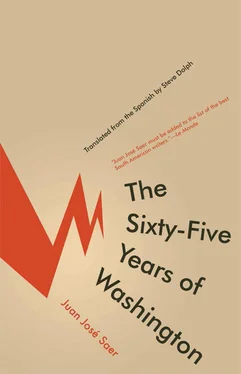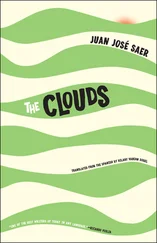Juan José Saer - The Sixty-Five Years of Washington
Здесь есть возможность читать онлайн «Juan José Saer - The Sixty-Five Years of Washington» весь текст электронной книги совершенно бесплатно (целиком полную версию без сокращений). В некоторых случаях можно слушать аудио, скачать через торрент в формате fb2 и присутствует краткое содержание. Год выпуска: 2010, Издательство: Open Letter, Жанр: Современная проза, на английском языке. Описание произведения, (предисловие) а так же отзывы посетителей доступны на портале библиотеки ЛибКат.
- Название:The Sixty-Five Years of Washington
- Автор:
- Издательство:Open Letter
- Жанр:
- Год:2010
- ISBN:нет данных
- Рейтинг книги:3 / 5. Голосов: 1
-
Избранное:Добавить в избранное
- Отзывы:
-
Ваша оценка:
- 60
- 1
- 2
- 3
- 4
- 5
The Sixty-Five Years of Washington: краткое содержание, описание и аннотация
Предлагаем к чтению аннотацию, описание, краткое содержание или предисловие (зависит от того, что написал сам автор книги «The Sixty-Five Years of Washington»). Если вы не нашли необходимую информацию о книге — напишите в комментариях, мы постараемся отыскать её.
The Sixty-Five Years of Washington — читать онлайн бесплатно полную книгу (весь текст) целиком
Ниже представлен текст книги, разбитый по страницам. Система сохранения места последней прочитанной страницы, позволяет с удобством читать онлайн бесплатно книгу «The Sixty-Five Years of Washington», без необходимости каждый раз заново искать на чём Вы остановились. Поставьте закладку, и сможете в любой момент перейти на страницу, на которой закончили чтение.
Интервал:
Закладка:
— Oh yeah? says Leto. Who did you hear it from?
— Botón, says the Mathematician.
Leto nods. That name, or nickname rather, Button , appears every so often in conversation, but to Leto it doesn’t evoke any precise image because he’s never seen its owner. He seems to be from Entre Ríos, to study law, to have been a reformist leader, to be seen a lot at vernissages and conferences, and to be a guitar player. Three or four times he’s heard Tomatis say, speaking to a third person, things like, Last night we ran into Botón falling down at a bar at the arcade , or once, referring to a painter, Botón cleans her pipes . But Leto has never seen him. In fact, when he hears the nickname, the first thing he imagines is an actual button, black with four holes in the center, and only after a quick correction begins to see the image of a person, a guy with straight hair and dark, pockmarked skin, which doesn’t correspond to any experience but which makes up, as a stand in, for the absence of experience. There always has to be something , thinks Leto. If there’s nothing, you think that there’s nothing and that thought is something.
Yes, Botón indeed, the Mathematician has just repeated. Botón who, as it happened, ran into El Gato Garay at the School of Fine Arts and promised to bring his guitar but, since he hadn’t gone back home after the meeting, hadn’t actually brought the guitar and, after running some errands downtown, was the first to arrive in Colastiné, where the party was. He had bought three bottles of white wine. In case they ran out , says the Mathematician. He’s always afraid they’ll run out. According to Botón — and, afterward, according to the Mathematician, no? — since it couldn’t have been later than 5:00 and the sun was still high, and Basso, the owner of the ranch, had just gotten up from his siesta, they had gone behind the house to pick vegetables. According to the Mathematician, Basso has a vegetable garden, raises chickens, and, with some money his maternal grandmother left him, can get by without working. Leto, who doesn’t know either Basso or Botón, nor has he ever been to that house, sees two guys picking at black earth, backlit by the falling sun at the end of a mild winter, in the back of a patio whose image comes, without his realizing, from two or three different ranches he’s visited, in Colastiné and Rincón, since he moved from Rosario. And the spot where that ranch sits, as the name Colastiné includes a physical area that extends beyond his experience, is an approximate point, more or less imagined, which Leto places, without knowing or even asking himself why, in a border region between his experience and the many purely imaginary fragments associated with the word Colastiné, and which he has never seen.
But soon enough, the Mathematician says, the others began to arrive: the Garay twins, who had wanted to use their house in Rincón but weren’t able to at the last minute because their mother had decided to fumigate that week, and Cuello, the writer. Cuello, like a neck? says Leto. Cuello, neck, that’s right. The Centaur, Cuello the Centaur, says the Mathematician. The Centaur? repeats Leto, intrigued. The Mathematician starts laughing. Yeah. The Centaur. Because he’s half man, half beast. Leto laughs too, shaking his head. The laughter, expelled by human throats and which, at the same time, sparks in human eyes, spreads to the morning air outside. A pedestrian, passing them, a man in shirtsleeves carrying a portfolio under his arm, a chubby and all but bald forty-something, laughs too, without their noticing, infected by the burst of sudden laughter he has just heard. And the Mathematician continues: Cuello had come early, according to Botón (who had heard it from El Gato at Fine Arts) in case Noca, a fisherman, who was supposed to bring a load of catfish and perch, failed at the last minute, in which case, since he worked at the Butcher’s Co-op, he — Cuello, no? — would be able to get some leftover steaks in a pinch. But Noca did not fail; almost at the same moment as Cuello, but coming from the coast and not the city, he’d arrived with two baskets full of perch and catfish which, after having caught, he’d taken the trouble to clean and gut in the river water. Judging by how the Mathematician tells it, Botón reported Noca’s arrival in a manner resembling a Greek chorus. But as he relays it, the Mathematician, applying a rigorous protocol, dismantles his informant’s version: Botón, a gringo, assumes a country style whenever he feels like it; he has an excessive taste for the barbarous; the real litmus test is his patent inability to dance a single step of the local folk dances, neither the rasguido doble nor the chamarrita . He knows Noca: instead of going to fish himself, he spends the day at the disco; he buys his catch from the real fishermen and resells them to the locals. He’s going to end up a fruit wholesaler. Still, Botón’s version, despite the Mathematician’s categorical yet disinterested sociological objections, is the one Leto adopts and retains: the mythic Noca, hunting in the savage river, with timeless skill, for the last perch, prevails despite the collective displacement caused by the social mobility that produces incremental urbanization in the coastal region. But for the Mathematician, were he to notice, Leto’s reticence would be neither here nor there: in reality, just as no art critic would think to disparage a portrait by asserting that the pictured model is ugly, or old, or a man or woman, and instead would attack the painter’s technique, the Mathematician couldn’t give two shits about the object Noca in its objective objectivity , he says, speaking poorly and in haste, but not so the description made by Botón, composed, according to the Mathematician, of stereotypical apriorisms and not of real empirical data. Pure radiotelephonic material , says the Mathematician.
Leto doesn’t laugh now. The word radiotelephonic carries, as though pasted to its reverse side, the image of his father: but sadness isn’t what has erased the smile from his face, but rather that somewhat mechanical gravity we assume when, with its insistent call, a thought or memory lures us toward the internal. For a few seconds, the Mathematician’s narration, intense and highly detailed, becomes, little by little, loose words, sound without meaning, a distant murmur, as if, despite the identical rhythm of their walk and of their almost grazing arms, they are walking in dissociate spaces, proving how much a memory can separate two people until, finally, the call dissipates, not without leaving a vague pit inside him, like a stain on a white wall whose source you ignore, and eventually Leto smiles and becomes attentive again, and the words of the Mathematician who, as I was saying, no? is telling Leto about Washington Noriega’s birthday, emerge from the horizon of sound and continue filling his head with not always adequate images. And the twins . . says the Mathematician. They leave the sidewalk; a car stops at the corner, waiting to turn off San Martín; they hesitate, move around it, cross the intersection, which unlike the previous ones is paved and not cobblestone, and reach the opposite corner. They leave behind the sunlit street and continue under the shade of the trees. Since stepping into the street the Mathematician has been quiet, postponing what he was about to say and assuming a vigilant expression at seeing the car approach, an air of ostentatious hesitance when the car, stopping at the corner, blocks their path, and when they leave the car behind his hesitant air gives way to a distracted and reproachful shake of the head, which stops when they reach the opposite sidewalk. The Garay twins , Leto goes on thinking. The twins , continues the Mathematician when they enter the shade, had gotten a hose to install a keg of import. In the hypothetical courtyard, situated in a fantastical place, the human figures, simplified by Leto’s imagination, disperse and scatter, active, outlined against the twilight: the Centaur, Basso’s wife and their girls, Botón and Basso picking vegetables at the back, the twins installing, at the door to the kitchen, the keg, covering the hose with ice, and Noca’s carriage leaving for the coast by a sandy road that Leto and Barco once walked, three months before, on a Sunday morning, to fish. And while the Mathematician dispenses new names, the image, more or less stable, made of assorted memories, is populated by new figures who come to occupy a place and function: Cohen and Silvia, his wife, Tomatis and Beatriz, Barco and La Chichito — the Cohens have come on their own — and Beatriz, Barco, and La Chichito, who had gone to pick up Tomatis at the paper, where he came out with a stack of day-old newspapers, for wrapping up the fish on the grill. According to Basso or Botón, says the Mathematician, Marcos Rosemberg had brought wine the night before, twenty-four bottles, and was in charge of going to find Washington and taking him to Basso’s. Finally they arrive, just before nightfall; Marcos Rosemberg’s sky-blue car parks in front of the ranch. To be exact, the Mathematician only says, in Marcos Rosemberg’s car , but since Leto knows it, having gotten in three or four times, he imagines it the proper color, so that he sees, in the twilight, the sky-blue car arrive, undulating and quiet, shimmering slightly in the falling light, in front of the imaginary ranch. They gave him a prodigious welcome , says the Mathematician ironically, quoting Botón verbatim. Evidently, the tap to the keg was poorly installed — it came out all foam — so Barco, who is a genius with his hands, dismantled and reinstalled the tap. Is it working? Is it? inquired a circle of anxious faces. Finally it started to draw. Because it would cool off that night, they’d prepared a large table, which hadn’t been set, under the pavilion, near the grill. Overcoming a moment of confusion, Leto is forced to install the unforeseen pavilion among the trees at the back. Nidia Basso and Tomatis were making a bitter salad in the kitchen. Cohen, the psychologist, who was going to be the cook, was lighting a fire in the grill. Barco was filling glasses with beer, and Basso cut slices of strong cheese and mortadella on a board and passed it around. Beatriz was rolling a cigarette. Washington, who had just relieved himself of his old Aerolinas Argentinas bag, which was full of books and papers, held a glass of beer in his hand, without deciding to take the first drink. And Botón? Botón, for hours, seemed to have removed himself from his story, as if the role of observer precluded his intervention in the action. Introducing a subtle variation, the Mathematician comments that, in fact, Botón’s version of events demands, with Botón’s personality in mind, a continuous revision, aimed at translating the scene from the province of mythology to that of history , but Leto, right then, from beneath the persistent image of a courtyard on the coast, on a winter evening, full of familiar and unfamiliar faces that combine vaguely, Leto, I was saying, no? almost without realizing it, and even though it’s always the same, is thinking about another time, about Isabel, the incurable illness, about Lopecito saying next to the closed casket, his eyes full of tears: Your old man was a television pioneer. He had the inventor’s gift. I owe him everything.
Читать дальшеИнтервал:
Закладка:
Похожие книги на «The Sixty-Five Years of Washington»
Представляем Вашему вниманию похожие книги на «The Sixty-Five Years of Washington» списком для выбора. Мы отобрали схожую по названию и смыслу литературу в надежде предоставить читателям больше вариантов отыскать новые, интересные, ещё непрочитанные произведения.
Обсуждение, отзывы о книге «The Sixty-Five Years of Washington» и просто собственные мнения читателей. Оставьте ваши комментарии, напишите, что Вы думаете о произведении, его смысле или главных героях. Укажите что конкретно понравилось, а что нет, и почему Вы так считаете.












